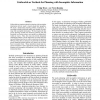Free Online Productivity Tools
i2Speak
i2Symbol
i2OCR
iTex2Img
iWeb2Print
iWeb2Shot
i2Type
iPdf2Split
iPdf2Merge
i2Bopomofo
i2Arabic
i2Style
i2Image
i2PDF
iLatex2Rtf
Sci2ools
AAAI
2000
2000
Gridworlds as Testbeds for Planning with Incomplete Information
Gridworlds are popular testbeds for planning with incomplete information but not much is known about their properties. We study a fundamental planning problem, localization, to investigate whether gridworlds make good testbeds for planning with incomplete information. We find empirically that greedy planning methods that interleave planning and plan execution can localize robots very quickly on random gridworlds or mazes. Thus, they may not provide adequately challenging testbeds. On the other hand, we show that finding localization plans that are within a log factor of optimal is NP-hard. Thus there are instances of gridworlds on which all greedy planning methods perform very poorly, and we show how to construct them. These theoretical results help empirical researchers to select appropriate planning methods for planning with incomplete information as well as testbeds to demonstrate them.
| Added | 01 Nov 2010 |
| Updated | 01 Nov 2010 |
| Type | Conference |
| Year | 2000 |
| Where | AAAI |
| Authors | Craig A. Tovey, Sven Koenig |
Comments (0)

